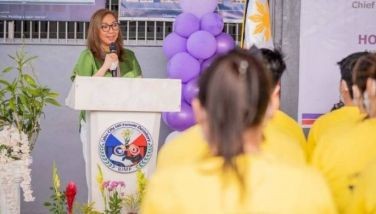Health experts raise alarm over rising kidney disease cases
MANILA, Philippines – Health experts expressed alarm yesterday over the rising cases of kidney disease in the country, saying that more than 10,500 Filipinos are afflicted with it.
Dr. Jade del Mundo, undersecretary of the Department of Health, said 120 per million of the population suffer from kidney failure and they have to undergo expensive kidney transplantation.
Del Mundo revealed that children account for 10 to 15 percent of the end-stage renal disease (ESRD), primarily because of their lifestyle-diet that is high in salt or sugar and lack of exercise.
ESRD pertains to a condition where there is a complete or near-complete failure of the kidney to perform its function to excrete waste and regulate electrolytes and urine.
“This is a cause for alarm. While the figure seems low, it is increasing at a rate of three percent annually,” said Del Mundo in an interview during the “National REDCOP (Renal Disease Control Program) Forum” of the National Kidney and Transplant Institute (NKTI).
He noted that 10 years ago, there were only 70 to 80 ESRD cases.
Citing the Philippine Renal Registry 2008, the official said that diabetes is a primary cause of ESRD at 41 percent, followed by inflammation of kidney, 24 percent, and high blood pressure, 22 percent.
In 2000 and 2002, kidney infections such as nephritisk, nephritic syndrome, and nephrosis, were the 10th killer disease among Filipinos.
At present, diabetes is the 9th leading killer, with hypertension being the fourth.
“It is clear from statistics that if the problems on diabetes, hypertension, kidney infections and others are not attended to, the magnitude of the kidney problem we will be facing in the future will overwhelm us,” Del Mundo said.
It is for this reason, he said, that the REDCOP was started in June 1994 as a Preventive Nephrology Project of the DOH, with NKTI as the implementing agency.
It is designed to conduct research to establish the real incidence of renal problems in the country, to assist health facilities in training healthcare providers, formulate guidelines and protocols, help in the development of dialysis and transplant centers, and establish an effective networking system with other programs and agencies.
REDCOP program manager Dr. Remedios de Belen-Uriarte urged vigilance against renal disorders.
She claimed that in 2007, more than 8,000 ESRD new patients underwent dialysis.
“That is expected only to be 50 percent of the total ESRD patients because the rest cannot dialyze for financial and other reasons, like lack of knowledge where they can access the facility,” she said.
In 2002, the number of ESRD patients dialyzing was about 4,000. It rose to over 5,000 in 2003, close to 6,000 in 2004, more than 6,000 in 2005 and 7,000 in 2006.
Uriarte maintained that everyone should take care of their kidneys because having ESRD entails huge expenses for transplantation.
“It is so expensive to have ESRD because the dialysis costs P3,000 to P7,000 per session and you need three sessions per week,” Uriarte said.
She said the treatment does not include medicine and laboratory tests.
“Patients will die if they don’t dialyze,” Uriarte said.
Del Mundo said to reverse the situation, Filipinos must adopt a healthy lifestyle that includes proper diet and nutrition, exercise and leisure, avoidance of hazardous substances like tobacco, alcohol, and drugs, and adequate stress management and relaxation.
- Latest
- Trending


























